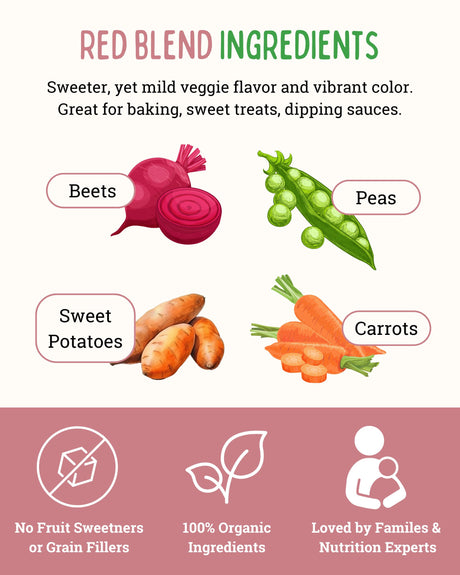The Prevalence of Food Sensitivities in Children
In recent years, the awareness of food sensitivities in children has grown significantly. It's not uncommon for parents, caregivers, and educators to encounter children who experience adverse reactions to certain foods.
This heightened awareness highlights the importance of understanding and addressing food sensitivities to ensure the well-being of our young ones.
The Impact of Food Sensitivities on Children's Health
Food sensitivities can have a profound impact on the health and daily lives of children. These sensitivities can manifest in various ways, from digestive discomfort and skin issues to behavioral changes and developmental challenges.
Recognizing and managing food sensitivities is crucial for promoting optimal health and ensuring that children thrive in their formative years.
Understanding Food Sensitivities
Navigating the Complexity of Children's Food Sensitivities
It's crucial to start by distinguishing between allergies, sensitivities, and intolerances. Food allergies involve the immune system's immediate response to a specific food, leading to potentially life-threatening reactions such as anaphylaxis.
Food intolerances are typically due to the body's inability to digest or process certain food components, like lactose intolerance. Food sensitivities, on the other hand, can be more challenging to pinpoint, as they often involve delayed reactions that affect various systems in the body.
Understanding these differences is fundamental to addressing children's food sensitivities effectively.
Common Food Triggers for Sensitivities in Children
Food sensitivities in children can arise from various dietary triggers. While sensitivities are highly individualized, some common culprits include dairy products, gluten-containing grains, soy, and specific food additives like artificial colors and preservatives.
It's important to note that each child's response to these triggers can vary, making it essential to monitor and identify specific sensitivities unique to your child. By recognizing these common triggers, parents and caregivers can take proactive steps in managing their child's food sensitivities while promoting a balanced and nourishing diet.
Identifying Food Sensitivities

Recognizing Signs and Symptoms of Food Sensitivities
Identifying signs and symptoms of food sensitivities in children can be challenging but essential for their well-being. Common manifestations include digestive issues like bloating, gas, and diarrhea, as well as skin problems such as eczema.
Behavioral changes like irritability, hyperactivity, and mood swings may also indicate sensitivities. Keep a close eye on your child's reactions to different foods and document any recurring symptoms.
This observation can provide valuable insights into potential sensitivities, helping you make informed dietary choices.
The Role of Medical Tests and Professional Diagnosis
While recognizing symptoms is a crucial first step, consulting a healthcare professional is essential for accurate diagnosis. Medical tests, such as blood tests, skin prick tests, and elimination diets supervised by a pediatrician or allergist, can help pinpoint specific food sensitivities.
Professional guidance is invaluable in distinguishing between sensitivities and other conditions, ensuring your child's nutritional needs are met while managing sensitivities effectively. Collaborating with healthcare experts provides tailored solutions for your child's unique situation, promoting their health and well-being.
Common Food Sensitivities in Children

Navigating Sensitivities to Gluten, Dairy, Nuts, and More
Gluten sensitivity, including conditions like celiac disease and non-celiac gluten sensitivity, is prevalent among children. Symptoms may include digestive discomfort, fatigue, and skin issues.
For gluten-sensitive children, adopting a gluten-free diet is essential. Fortunately, there is a wide range of gluten-free products and alternatives available, making it easier to enjoy favorite foods without gluten-related issues.
Managing Dairy Sensitivities
Dairy sensitivities often manifest as lactose intolerance or a reaction to specific dairy proteins. Symptoms can range from gastrointestinal distress to skin rashes. To manage dairy sensitivities, many dairy-free options like almond, soy, or oat milk are readily accessible.
Additionally, lactase supplements can help some children digest lactose more effectively, allowing them to enjoy dairy products without discomfort.
Addressing Nut Allergies
Nut allergies, particularly to peanuts and tree nuts, are common in children and can lead to severe allergic reactions. Managing nut allergies involves strict avoidance of nuts and nut-containing products.
It's crucial to read food labels carefully and communicate dietary restrictions with schools and caregivers. Nut-free alternatives are widely available, ensuring that children with nut allergies can still enjoy a wide variety of safe and delicious foods.
The Impact on Children's Nutrition

Nourishing Children with Food Sensitivities
One concern parents face when dealing with food sensitivities in their children is ensuring they receive all the essential nutrients necessary for growth and development. Eliminating entire food groups or specific foods can potentially lead to nutrient deficiencies.
To counter this, it's essential to consult with a healthcare professional or dietitian who specializes in pediatric nutrition. They can recommend suitable alternatives and supplements if needed to maintain a well-rounded diet.
Balancing Nutritional Needs
Balancing the nutritional needs of a child with food sensitivities requires careful planning. While some foods may need to be restricted, there are plenty of nutrient-rich alternatives available.
For example, if dairy is off-limits due to lactose intolerance, calcium can be sourced from fortified dairy-free milk or leafy greens. Managing sensitivities may involve creative substitutions and a focus on nutrient-dense foods to ensure children receive the vitamins and minerals they need for optimal health.
Practical Tips for Managing Food Sensitivities
Creating a Safe and Supportive Home Environment
Ensuring your home is a safe and supportive environment for your child with food sensitivities is essential. Start by educating other family members about the sensitivities and the importance of avoiding trigger foods.
This helps create a unified approach to meal planning and preparation.
Organize your kitchen to minimize cross-contamination risks. Designate separate utensils, cutting boards, and storage containers for foods your child is sensitive to.
Label these items clearly to prevent mix-ups. Additionally, maintain a well-organized pantry and fridge, making it easy to find safe ingredients and snacks.
Strategies for Dining Out and Social Gatherings
Managing food sensitivities in social settings and restaurants can be challenging but is entirely feasible with the right strategies. When dining out, research restaurant menus in advance to identify safe options. Many restaurants now provide allergen information on their websites or upon request.
Don't hesitate to communicate your child's sensitivities to restaurant staff. Speak with the server or manager to ensure the kitchen is aware of your child's dietary restrictions. Choose simpler dishes with fewer ingredients to minimize the risk of cross-contamination.
Meal Planning and Recipes for Children with Sensitivities

Nutritious and Enjoyable Meals
When it comes to children with food sensitivities, meal planning becomes a vital component of their dietary management. The key is to create balanced, nutritious, and enjoyable meals that cater to their specific needs.
This often involves a mix of whole, minimally processed foods that are naturally free of allergens or sensitivities and smart substitutions for problematic ingredients.
Incorporating EasyPeasie
EasyPeasie Veggie Blends can be a game-changer for parents navigating food sensitivities in their children. These convenient products offer a range of vegetable powder blends that are both nutritious and tasty.
Sneak them into recipes like pasta sauces, soups, and smoothies to enhance the nutritional profile of your child's meals. EasyPeasie makes it easier than ever to ensure your child gets their daily dose of veggies while enjoying their favorite dishes.
Recipes That Accommodate Sensitivities
Preparing meals for children with food sensitivities doesn't have to be a daunting task. There are plenty of easy-to-follow recipes that cater to specific dietary needs. Whether it's gluten-free pancakes, dairy-free mac 'n' cheese, or nut-free energy bars, these recipes can satisfy your child's cravings while avoiding trigger ingredients.
Plus, with the right substitutions and creative culinary techniques, you can whip up dishes that even the pickiest eaters will love.
Seeking Professional Guidance
When to Consult with Healthcare Professionals
Dealing with food sensitivities in children can be challenging, and there are instances where seeking professional guidance becomes essential. If you notice severe or persistent symptoms like chronic diarrhea, weight loss, or failure to thrive, it's crucial to consult with a healthcare professional promptly.
Additionally, if your child's food sensitivities are causing undue stress or impacting their quality of life, it's wise to seek expert advice. Early intervention and professional guidance can prevent complications and ensure your child receives the necessary care.
The Role of Dietitians and Allergists
Dietitians and allergists play pivotal roles in managing food sensitivities in children. Dietitians specialize in nutrition and can help you plan well-balanced meals that cater to your child's sensitivities while ensuring they receive essential nutrients.
They can also offer practical advice on label reading, ingredient substitutions, and understanding food sensitivities. Allergists, on the other hand, are medical professionals who specialize in allergies and sensitivities. They can conduct allergy tests and diagnostic assessments to pinpoint specific triggers.
Collaborating with an allergist can lead to a clearer understanding of your child's sensitivities and help establish the most effective management strategies.
Supporting Children Emotionally
Addressing the Emotional Impact of Food Sensitivities
Food sensitivities can have an emotional impact on children, especially when they see their peers enjoying foods they can't. It's essential to address their feelings and provide emotional support.
Encourage open communication with your child, allowing them to express their emotions and concerns. Help them understand that their dietary restrictions are not their fault and that their health is the top priority.
As a parent, your empathy and understanding can go a long way in helping your child navigate the emotional aspects of food sensitivities. Encourage them to focus on the delicious foods they can enjoy and assure them that you're there to support them every step of the way.
Fostering a Positive Relationship with Food
Maintaining a positive relationship with food is crucial for children with sensitivities. Emphasize the importance of nourishing their bodies with the right foods while reinforcing that there are plenty of tasty options available to them.
Avoid using negative language or restrictions around food, as this can lead to anxiety and a negative perception of eating. Engage your child in meal planning and preparation to make them feel more involved and in control of their diet.
Encourage them to explore new foods within their dietary boundaries, celebrating each discovery. By fostering a positive relationship with food, you can help your child develop a healthy attitude towards eating, even in the face of sensitivities.
Recap of Key Takeaways
In summary, managing food sensitivities in children requires a comprehensive and understanding approach. Begin by recognizing the prevalence and impact of food sensitivities on children's health.
Understand the differences between allergies, sensitivities, and intolerances and the common food triggers to be aware of. Identify signs and symptoms and know when to seek professional guidance for a proper diagnosis.
Encouraging a Balanced Approach
It's crucial to emphasize that managing food sensitivities doesn't mean sacrificing nutrition or enjoyment. Parents can create balanced and nutritious meals through meal planning and recipes tailored to their child's sensitivities.
Seek professional guidance when needed, involving dietitians and allergists to navigate the complexities of food sensitivities. Fostering emotional support and maintaining a positive relationship with food is equally vital. Encourage open communication with your child about their sensitivities, and address any emotional impact sensitivities may have.
Finally, equip yourself with practical tips for both the home environment and dining out to ensure your child can enjoy a variety of experiences while managing their sensitivities. Taking a holistic approach to managing food sensitivities in children ensures their health and well-being are prioritized while allowing them to thrive despite dietary restrictions.













